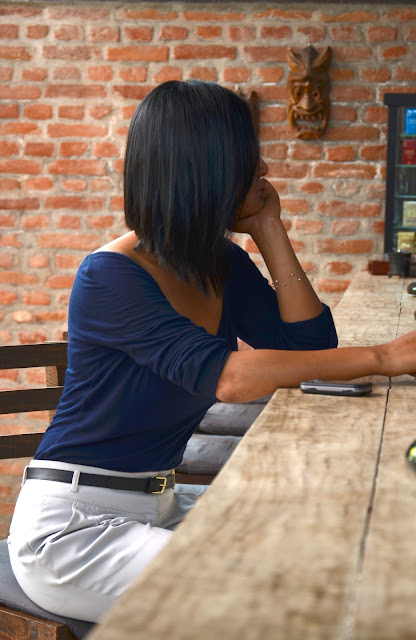I was going through old photo albums at my mamaghar over a
breakfast of crunchy and mouth-watering ‘jeri swari.’ The syrup and rich ghee from
the ‘jeri’ dripped, making the table sticky. My grandmother longingly gazed at
my half eaten ‘jeri swari.’ I offered her some but she refused. Being a
diabetic patient, she could not afford to indulge in these heavenly bites. Wiping
the excess ghee off my hands, I continued to flip through the albums that had no
colors in them.
A photo then took my fancy as it stood out from other group
photos and I asked my grandmother to tell me more about it. She said a few
things and left it at that. I looked at my grandmother: her silvery black hair
was neatly rolled into a bun, and she was dressed in a printed cotton sari. I
looked at the young woman in the photo – she was smartly dressed and had a
captivating smile. My instinct told me that there was more to this photo so I
nagged her to tell me more. Reluctantly, she gave in. And for the first time, I
saw my grandmother in a new light; I saw her not as my grandmother but as a
woman. Her voice had a new momentum as she shared chapters of her life that she
had locked somewhere deep within her. I was enchanted by the memories that
surfaced as my grandmother relived those moments again.
I don’t remember the exact date- early 60s I
think. We were on our way to Pharping, a holy site for Buddhists, which is
approximately 19 kilometers away from Kathmandu. We occasionally used to go
there for ‘puja’, or to meet my brother-in-law and his wife. There were six of
us- your grandfather, Krishna Shrestha, his friend who took the photo, my
cousin Suba Laxmi and a porter who carried my fourth child, your aunt Karuna who
was a year old then and breast feeding (not in the photo). Your grandfather had
hired a car to take us to Pharping, which cost 60 rupees then. Nowadays, I hear
it costs around 800 rupees.
The first time I was there,
I was 10 years old and thus was carried by a porter from Kathmandu to Pharping,
while the others walked. That was five months after an elaborate ceremony with a
14-year old stranger and me. After the ceremony, I was carried in a cloth and
bamboo ‘du’ to this stranger’s house by two men and a band playing koncha khin.
I was dressed in a guniyo cholo woven from silver threads and decorated in gold
jewellery. The headgear felt tight and the heavy clothes made it difficult for
me to walk. I was asked to cry but didn’t because the numerous activities
around kept me entertained, and one of my relatives pinched me hard thinking
that that might do the trick. Still I did not shed a tear. I was given five
dolls made out of cloth. Your grandfather and I used to play with them on the
balcony. On that day I had found a new playmate.
Your grandfather was
the only son and thoroughly pampered. He liked to dress up in formal trousers
and coats. He loved theater and arts. He usually spent his time rehearsing for
plays with the Russians at the Nepal Soviet Sanskritic Sanga. Participating in
plays was not regarded as a respectable hobby in the society at that time. I
watched him perform only once. It was at the hall in Singha Durbar.
I bore a son at the
age of 20 and we named him Chiranjivi, hoping for his ‘long life.’ After losing
three infants to various diseases, he was a blessing and a joy to our lives.
Shortly after Chiranjivi’s birth, your grandfather wanted to take me to one of
his numerous plays. Instead, he received a lashing from my mother for indulging
in theater even after becoming a father.
I was awed by this woman’s journey as she had gone through
so much and yet had chosen to remember her life in a positive light. My
grandmother, now 76 years old, shyly laughs as she reminisces her youthful past
with her husband who was her playmate, friend and a partner.
...
EC



























